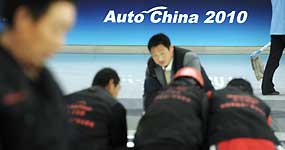
北京东四环北路附近,枫花园汽车电影院的霓虹灯闪亮在薄雾笼罩的夜色下,整个场景就像上世纪50年代的美国。
这是一个充斥着汽车和马尾辫的世界,还有脚穿溜冰鞋的女服务员。这也是中国未来的一瞥。
因为,中国正快速形成一种美国式的汽车崇拜,这可能对中国社会产生一些深远影响。
但这种现象也将对一些企业具有巨大影响,这些企业有意获利于中国人对汽车的迷恋,其中不少企业昨日正为在北京国际汽车展上展出自己的产品做着准备。
汽车制造商正赚得盆满钵满,销量在去年增长45%,2010年首季度同比增长72%。
但是,未来的赢利业务,将是众多有待建成的洗车连锁店和铬车轮盖商店,以及在中国乡村开始出现的汽车旅馆和农家菜餐厅。
中国的高速公路网络在10年内很可能赶上美国的规模(这在一定程度上是全球金融危机的意外副作用,因为危机促使北京方面动用刺激资金建设收费公路)。有鉴于此,中国的汽车文化正行驶在快速扩张的道路上。
中国第一代汽车爱好者正迅速迷恋上汽车带来的广阔空间。
“我喜欢速度,我喜欢自由,我不能想象没有汽车会是怎样,”39岁的侯铭心(音译)表示。他自豪地拥有一辆2000年吉普切诺基(Jeep Cherokee),用于开到内蒙古草原上驰骋,还有一辆双门大众高尔夫(Volkswagen Golf)小型车,用于在北京市区出行。
“中国人有生以来第一次拥有个人机动性,”为许多领先汽车公司提供建议的Alix Partners中国主管伊沃•瑙曼(Ivo Naumann)表示。“对中国人来说,这是一份自由。”
枫花园汽车电影院的“Drive-In”霓虹灯招牌使用数英尺高的复古字体。站在招牌前的经理刘存玉(音译)表示,在大多数周末,会有600来辆汽车光顾他的影院,工作日则会有200到300辆汽车。他指出,光顾汽车影院对年轻情侣是一大乐趣。具有讽刺意味的是,中国发现道路的浪漫之时,西方人似乎正失去这种感觉。“成熟市场的较年轻一代不愿购买汽车,尤其是在欧洲和日本,”汽车咨询公司TNS Auto上海办事处的包亦农(Klaus Paur)表示。
“但在中国,正是较年轻的一代在界定着汽车市场。”
而这些年轻人不仅想从拥有汽车中获得自由,还想得到友情。
从上周六上海A30公路在城郊结合部的最后一个收费站以外形成的交通拥堵,可以明显看出这个事实。
世界汽车之友俱乐部(World Car Friendship Club)以及上海市其它许多汽车爱好者协会的会员,当时正集合起来,一起去采摘草莓。多数人同意,若没有汽车带来的便利,他们是永远不会尝试这种活动的。一队多数由年轻女子驾驶的柔和色调的大众甲壳虫(VW Beetles),排成庄严的单列纵队行进,为了保持队形甚至不惜闯红灯。有些汽车贴着多个俱乐部的标识。就像许多汽车俱乐部爱好者那样,世界汽车之友俱乐部的组织者表示,参加俱乐部的最重要原因是扩大自己的社交圈子。
他有一次组织10万名汽车俱乐部会员出行,到邻近上海的杭州吃螃蟹。就连美国婴儿潮时期人士也会惊叹这样的“壮举”。
因为,如果说美国的汽车热潮大部分发生在州际公路时期(上世纪50和60年代,美国州际公路系统快速发展),那么中国的汽车热潮在很大程度上是互联网时期的现象。事实上,不妨把它想象成带有汽车特色的Facebook。
汽车正在释放中国的能量(就像它们上世纪在美国所发挥的作用一样),它们带来的那种自由,就连封堵Facebook的北京方面也能容忍。
译者/和风
http://www.ftchinese.com/story/001032339

In the centre of Beijing, neon-bright against a misty night, the Feng Hua Yuan drive-in cinema appears like an apparition from 1950s America.
It is a world of jalopies and ponytails, and waitresses on roller skates – and a vision of China's future.
For China is rapidly developing a US-style cult of the automobile that could have some profound implications for Chinese society.
But the phenomenon will have huge implications too for the companies poised to make money from it, many of which were yesterday preparing to display their wares at the Beijing motor show.
Carmakers are cashing in, with sales rising 45 per cent last year, and 72 per cent in the first quarter of 2010, year on year.
But the moneymakers of the future will be the many car-wash chains and chrome-wheel cover stores that have yet to be built, and the motor inns and farm-style restaurants that have begun to spring up in the the nation's countryside.
With a highway network that could well rival that of the US within a decade – in part a fortuitous side-effect of the global financial crisis, which spurred Beijing to use stimulus cash to build toll roads – China's car culture is on the route to rapid expansion.
The first generation of Chinese car-lovers is rapidly falling in love with all that space.
“I like the speed, I like the freedom, I can't imagine not having a car,” says Hou Mingxin, 39, proud owner of a 2000 Jeep Cherokee, which he uses to drive to the wild grasslands of Inner Mongolia, and a two-door Volkswagen Golf runabout, for navigating Beijing's urban wasteland.
“It is the first time in their lives that Chinese people have individual mobility,” says Ivo Naumann, head of Alix Partners in China, which advises many leading car companies. “It's a piece of freedom for the Chinese people.”
Standing before a sign that says “Drive-In”, in neon retro letters several feet high, manager Liu Cunyu says 600 cars turn up most weekends at his theatre, and 200-300 on weekdays. He points out that attending the drive-in is fun for young lovers. The irony is that China is discovering the romance of the road just as Westerners seem to have lost it. “The younger generation in mature markets is reluctant to buy cars, especially in Europe and Japan,” says Klaus Paur, of TNS Auto in Shanghai.
“But in China, it's the younger generation that is defining the car market.”
And those youngsters want not just freedom through car ownership, but also friendship.
That fact is obvious from the traffic jam that developed last Saturday on Shanghai's A30 motorway, just past the last toll booth on the edge of the city.
Members of the World Car Friendship Club (and many of the city's other car affinity societies) were congregating to go strawberry picking – an activity that most agreed they would never have attempted without the benefits of a car. A cortege of pastel-coloured VW Beetles, driven mostly by young girls, proceeded past in stately single file, running red lights to stay in formation. Some cars were plastered with multiple club logos. Like many car club aficionados, the organiser of the World Friendship club says the most important reason for joining a club is to expand his social circle.
He once organised an outing for 100,000 car club members to eat crab in nearby Hangzhou – a feat that even US baby boomers would marvel at.
For if America's car boom took place mostly in the interstate age – the 1950s and 60s when the US interstate highway system exploded – China's car boom is very much a phenomenon of the internet age. In fact, think of it as Facebook, with automotive characteristics.
Cars are liberating China in the same way that they did America in the last century – offering a kind of freedom that even Facebook-blocking Beijing can live with.

没有评论:
发表评论